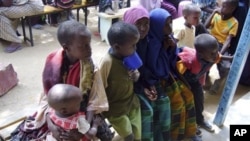Somalia’s Council of Ministers issued a statement Thursday calling for dramatic intervention on the part of the United Nations and the international community to prevent the country’s current drought from becoming a major catastrophe. Somali government spokesperson Abdirahman Omar Osman spoke with VOA just before the appeal was issued.
“The Council of Ministers, first of all, would like to make an extreme appeal to the international community, in particular agencies responsible for humanitarian aid and assistance," said Osman. "They are calling for them urgently to reach to Somalis inside the country as well as those who fled the country.”
The international humanitarian community has been sounding alarms for Somalia and northern Kenya as a deepening drought is pushing the region into what have been called “pre-famine conditions.” Wednesday, the U.N. Office for the Coordination of Humanitarian Affairs said the failure of the past two seasonal rains have caused one of the driest periods since 1950. The agency forecast a similarly bleak picture through 2012.
The drought has been building since the failure of the region’s seasonal rains last October and November. Now, after yet another dry season the situation has become dire. Osman estimated that as many as 10,000 people have arrived in Mogadishu over the past week seeking assistance. While Somalia’s Transitional Federal Government has established centers to accommodate the needs of internally displaced people, the spokesman says the massive influx in recent weeks has overwhelmed the facilities.
“If the situation continues, the Council of Ministers believe this is worse than 1992 when the international community came to help the country," he said. "They don’t want the situation to deteriorate any further.”
Between 1991 and 1992 Somalia experienced a famine which killed an estimated 300,000 people. A prolonged drought was aggravated by warlords who seized humanitarian aid and sold it in Mogadishu’s markets. In August of 1992, the United States led a military intervention in an attempt to remove the warlords and end the famine.
Somalia’s current drought is being exacerbated by the Islamist insurgent group al-Shabab. The al-Qaida-linked group, which controls much of southern Somalia, has denied humanitarian organizations access to much of the region and its people.
Osman told VOA that an intervention, similar to 1992, could help prevent the current drought from worsening. The spokesman said any and all assistance was needed immediately to avoid disaster.
The problem is not limited to Somalia. The relief agency Save the Children has reported that about 1,300 people - including nearly 800 children - are crossing the Somali-Kenyan border each day to seek relief. Kenya’s main refugee camp, Dadaab, is now severely overcrowded, with an estimated 350,000 refugees living in camps designed for approximately 90,000. According to the U.N. Refugee agency a further 31,000 Somali refugees have fled to Ethiopia in the past five months.
Somalia has not had a functioning central government since the fall of Mohammed Siad Barre in 1991.
Somalia Appeals for International Assistance as Drought Worsens




